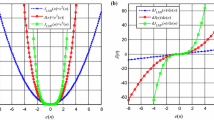Abstract
In the present work a sliding window approach for the Levenberg-Marquardt algorithm is used for on-line modelling a time variant system. The system used is a first order cruise control in which a modification is introduced to change the system gain at some point of operation. The initial control of the cruise control is performed by a PI not particularly optimised but enough to keep the system working within the intended range, which is then replaced by an Artificial Neural Network as soon as it is trained, using an Internal Model Controller loop.
Preview
Unable to display preview. Download preview PDF.
Similar content being viewed by others
References
Levenberg, K.: A method for the solution of certain problems in least squares. Quart. Appl. Math. 2, 164–168 (1944)
Marquardt, D.: An algorithm for least -squares estimation of nonlinear parameters. SIAM J. Appl. Math. 11, 431–441 (1963)
Nørgaard, M., Ravn, O., Poulsen, N.K., Hansen, L.K.: Neural Networks for Modelling and Control of Dynamic Systems. Springer, Heidelberg (2000)
Ngia, L.S.H.: System Modeling Using Basis Functions and Application to Echo Cancelation, Ph.D. thesis, Department of Signals and Systems School of Electrical and Computer Engineering, Chalmers University of Technology (2000)
Ferreira, P., Faria, E., Ruano, A.: Neural network models in greenhouse air temperature prediction. Neurocomputing 43(1-4), 51–75 (2002)
Dias, F.M., Antunes, A., Vieira, J., Mota, A.M.: Implementing the levenberg-marquardt algorithm on-line: A sliding window approach with early stopping. In: 2nd IFAC Workshop on Advanced Fuzzy/Neural Control (2004)
Morgan, N., Bourlard, H.: Generalization and parameter estimation in feedforward nets: Some experiments. In: Touretzsky, D. (ed.) Advances in Neural Information Processing Systems, pp. 630–637. Morgan Kaufmann, San Francisco (1990)
Sjöberg, J.: Non-Linear System Identification with Neural Networks, Ph.D. thesis, Dept. of Electrical Engineering, Linköping University, Suécia (1995)
Dias, F.M., Antunes, A., Mota, A.: A new hybrid direct/specialized approach for generating inverse neural models. WSEAS Transactions on Systems 3(4), 1521–1529 (2004)
Nørgaard, M.: Neural network based system identification toolbox for use with matlab, version 1.1, technical report. Tech. Rep. Technical University of Denmark (1996)
Nørgaard, M.: Neural network based control system design toolkit for use with matlab, version 1.1, technical report. Tech. Rep., Technical University of Denmark (1996)
Author information
Authors and Affiliations
Editor information
Editors and Affiliations
Rights and permissions
Copyright information
© 2006 Springer-Verlag Berlin Heidelberg
About this paper
Cite this paper
Dias, F.M., Antunes, A., Vieira, J., Mota, A.M. (2006). On-Line Learning of a Time Variant System. In: Ali, M., Dapoigny, R. (eds) Advances in Applied Artificial Intelligence. IEA/AIE 2006. Lecture Notes in Computer Science(), vol 4031. Springer, Berlin, Heidelberg. https://doi.org/10.1007/11779568_97
Download citation
DOI: https://doi.org/10.1007/11779568_97
Publisher Name: Springer, Berlin, Heidelberg
Print ISBN: 978-3-540-35453-6
Online ISBN: 978-3-540-35454-3
eBook Packages: Computer ScienceComputer Science (R0)




